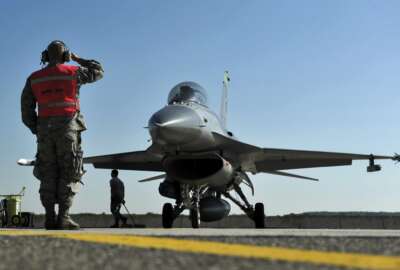
Air Force thinking of new ways to handle ‘black swan’ events in acquisition
The Air Force is exploring multiple options to ensure the service gets the products it wants and helps industry where it is struggling along the way. The war in...
Best listening experience is on Chrome, Firefox or Safari. Subscribe to Federal Drive’s daily audio interviews on Apple Podcasts or PodcastOne.
SAN DIEGO – The government hasn’t had it easy when it comes to predicting what world events will be thrown its way over the past few years, and in turn, that has an impact on budgeting, businesses and their supply chain.
The Air Force and other military organizations are dealing with a handful of “black swans” as Maj. Gen. Camron Holt, Air Force deputy assistant secretary for contracting, called them. The war in Ukraine, supply chain shortages, COVID and inflation are all throwing a wrench in pricing and contracting.
Holt said the Air Force is exploring multiple options to ensure the service gets the products it wants and helps industry where it is struggling along the way.
One option that could benefit both sides is to change the way the Air Force approaches supply chains.
“Running inventories on the ragged edge of how low you can get it is always best for a balance sheet and a business,” Holt told Federal News Network. “But, when you have the possibility of the several black swans coming or the dynamics of inflation or war in Ukraine or other disruptive influences, I think that there’s ways to start examining our supply chains in ways that we haven’t done before.”
Holt said the service can take the burden off suppliers by using tools that analyze the fragility of supply chain and then directly funding additional inventories beyond what would be normally acceptable.
The process wouldn’t go as far stockpiling goods, but it would add some cushion for the Air Force and suppliers to ensure airmen get what they need and businesses aren’t hit too hard on their bottom line.
“It may not be very expensive, but the resilience that it adds in the supply chain without harming the balance statement of that company could be enormous,” Holt said. “If we analyze and understand our supply chains better, then I think we’ll see a lot of those kinds of opportunities to improve the resilience and drop the cost while companies maintain a healthy profit.”
While keeping larger inventories might help supply chains become more resilient, Holt said government needs to rethink its budgeting process in general if the military wants to keep up with a world that is changing faster than ever.
Holt said the military’s demands to buy faster are in high demand, but the ability to do that runs up against constitutional and congressional resistance.
Congress has already charged the Defense Department with looking at its planning, programing, budgeting and execution (PPBE) process. The 2022 Defense authorization act sets up a commission to review how the Pentagon plans out its financial situation.
“Let’s say you find a great prototype someplace and you want to buy it. Well, did you have the foresight two years ago to plan it into your POM? If you didn’t, guess what? You have no authority to buy it,” Heidi Shyu, the undersecretary of Defense for Research and Engineering said in an interview with Federal News Network last fall. “And let’s say you’re going to plan it into your POM. Well, in two years time, maybe you’ll get the money, but the technology is already several years old. The PPBE process is too sequential, too linear, too old-fashioned. It works really well if you’re moving at a very slow, very methodical, very risk-averse pace. But in today’s world, when competition against your adversaries is key, it’s got to change.”
Holt said changing the PPBE process, while staying true to the statues of oversight may be critical to ensuring U.S. military dominance.
“I think the budgeting process definitely needs to change. I’m really proud of the House Armed Services Committee and the Senate Armed Services Committee for recognizing that,” he said. “I think the appropriators need to be involved in that discussion as well. The effort is to make sure that we don’t defy our own constitution. I think there are private sector models that can change incentives and keep insight and oversight solid, but modernize that oversight in a way that at first may be a little bit concerning, but I think would be effective.”
Holt noted that rivals like China can move funds quickly, while the United States has a time consuming process.
“I’m actually more urgently interested in the oversight inside of execution year,” Holt said. “I do understand these arguments. I know that the executive branch hasn’t always been the greatest actors in terms of meeting the will of Congress in terms of what buckets of money we spend and how we spend it. I don’t think that friction is going to change. I do think that we as a nation have got to start thinking about how do we allow for some judgment and some decision making at the point of attack at the point of execution. Where we can avoid holes in maybe dozens of acquisition programs that we did not anticipate? Can we rapidly move money to an emerging technology we had no idea existed a year ago?”
Copyright © 2025 Federal News Network. All rights reserved. This website is not intended for users located within the European Economic Area.
Scott Maucione is a defense reporter for Federal News Network and reports on human capital, workforce and the Defense Department at-large.
Follow @smaucioneWFED
Related Stories





